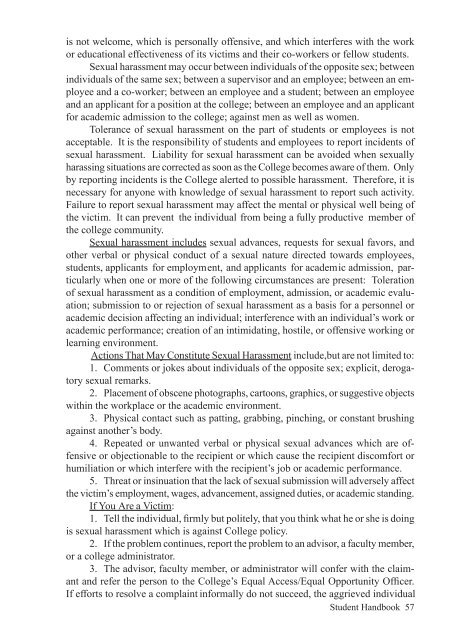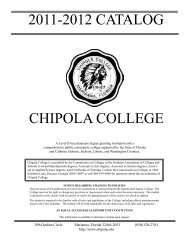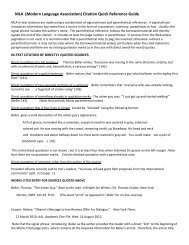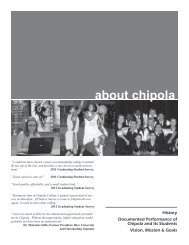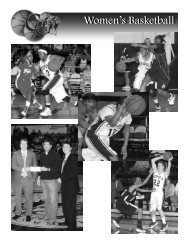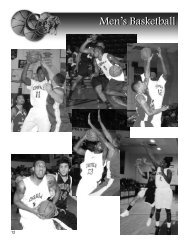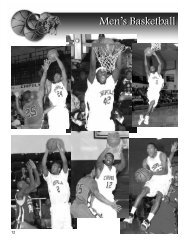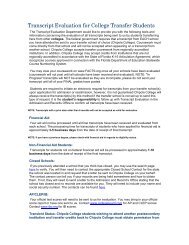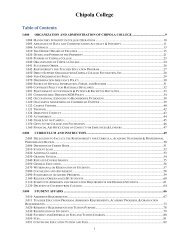Student Handbook - Chipola College
Student Handbook - Chipola College
Student Handbook - Chipola College
Create successful ePaper yourself
Turn your PDF publications into a flip-book with our unique Google optimized e-Paper software.
is not welcome, which is personally offensive, and which interferes with the work<br />
or educational effectiveness of its victims and their co-workers or fellow students.<br />
Sexual harassment may occur between individuals of the opposite sex; between<br />
individuals of the same sex; between a supervisor and an employee; between an employee<br />
and a co-worker; between an employee and a student; between an employee<br />
and an applicant for a position at the college; between an employee and an applicant<br />
for academic admission to the college; against men as well as women.<br />
Tolerance of sexual harassment on the part of students or employees is not<br />
acceptable. It is the responsibility of students and employees to report incidents of<br />
sexual harassment. Liability for sexual harassment can be avoided when sexually<br />
harassing situations are corrected as soon as the <strong>College</strong> becomes aware of them. Only<br />
by reporting incidents is the <strong>College</strong> alerted to possible harassment. Therefore, it is<br />
necessary for anyone with knowledge of sexual harassment to report such activity.<br />
Failure to report sexual harassment may affect the mental or physical well being of<br />
the victim. It can prevent the individual from being a fully productive member of<br />
the college community.<br />
Sexual harassment includes sexual advances, requests for sexual favors, and<br />
other verbal or physical conduct of a sexual nature directed towards employees,<br />
students, applicants for employment, and applicants for academic admission, particularly<br />
when one or more of the following circumstances are present: Toleration<br />
of sexual harassment as a condition of employment, admission, or academic evaluation;<br />
submission to or rejection of sexual harassment as a basis for a personnel or<br />
academic decision affecting an individual; interference with an individual’s work or<br />
academic performance; creation of an intimidating, hostile, or offensive working or<br />
learning environment.<br />
Actions That May Constitute Sexual Harassment include,but are not limited to:<br />
1. Comments or jokes about individuals of the opposite sex; explicit, derogatory<br />
sexual remarks.<br />
2. Placement of obscene photographs, cartoons, graphics, or suggestive objects<br />
within the workplace or the academic environment.<br />
3. Physical contact such as patting, grabbing, pinching, or constant brushing<br />
against another’s body.<br />
4. Repeated or unwanted verbal or physical sexual advances which are offensive<br />
or objectionable to the recipient or which cause the recipient discomfort or<br />
humiliation or which interfere with the recipient’s job or academic performance.<br />
5. Threat or insinuation that the lack of sexual submission will adversely affect<br />
the victim’s employment, wages, advancement, assigned duties, or academic standing.<br />
If You Are a Victim:<br />
1. Tell the individual, firmly but politely, that you think what he or she is doing<br />
is sexual harassment which is against <strong>College</strong> policy.<br />
2. If the problem continues, report the problem to an advisor, a faculty member,<br />
or a college administrator.<br />
3. The advisor, faculty member, or administrator will confer with the claimant<br />
and refer the person to the <strong>College</strong>’s Equal Access/Equal Opportunity Officer.<br />
If efforts to resolve a complaint informally do not succeed, the aggrieved individual<br />
<strong>Student</strong> <strong>Handbook</strong> 57


